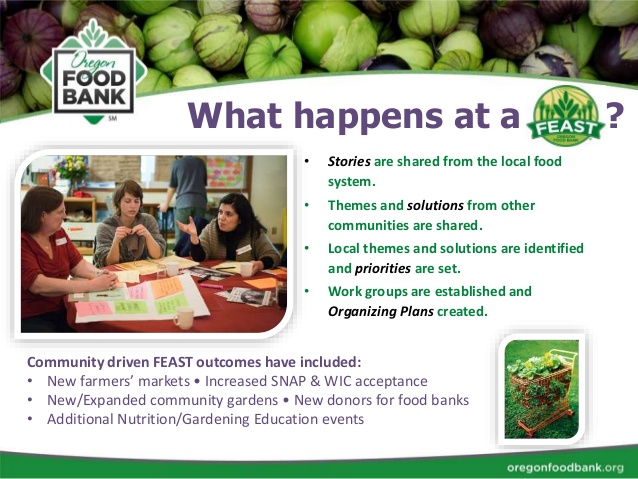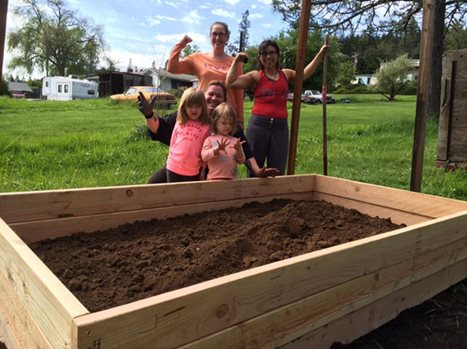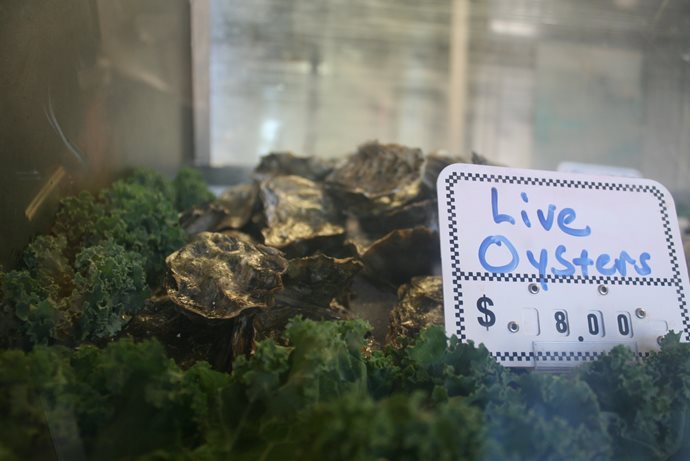When looking for examples of local initiatives to promote healthy food access, examples abound of community gardens, farmers’ markets and expanded produce offerings in local stores. But the work of NeighborWorks Umpqua stands out for its out-of-the-box and comprehensive approach—ranging from an initiative to encourage and support backyard vegetable gardens to a diverse partnership focusing on channeling fresh, local seafood to more local tables rather than into the global export market.
And it all started, says Michelle Martin, the organization’s director of economic development, by … listening.
In 2011, NeighborWorks Umpqua became a local partner of the Oregon Food Bank, which states in its mission that, “in order to truly end hunger, we need to engage the whole community to develop innovative solutions that address its root causes.” Its way of engaging people throughout the state, especially in rural areas, is to combine a social-research approach to data gathering with grassroots organizing to create a plan for creating a community food system shaped and owned by residents.
Just what is a community food system? The Oregon food bank defines it as the integration of food production, processing, distribution and waste management in a way that enhances the economy, environment, health and social fabric of a place.” A plan for achieving this is developed in each county through events called FEASTs—“facilitated discussions about food, education and agriculture to develop solutions together.” A step-by-step guide to holding a FEAST of your own can be found on the bank’s website.

To help its local collaborators organize the assessments and implement the action plans, the food bank partners with the Resource Assistance for Rural Environments (RARE) AmeriCorps program, placing one graduate-level worker with each local host organization.
Martin says NeighborWorks Umpqua held its first FEAST in Douglas County, Oregon, where one in four children lives in poverty and one in three faces uncertainty about where his or her next meal will come from. Both of these figures are higher than the state and national rates. Two more counties followed. The resulting community food assessments for each (take a look at the comprehensive report for Douglas County) have led to an ever-evolving roster of collaborations. Here are just a few:
 Kitchen Garden Project: Created to encourage residents to plant and eat their own vegetables, the project builds garden beds, provides seeds, sponsors workshops and facilitates connections within the greater gardening community. Low-income residents receive the resources free of charge.
Kitchen Garden Project: Created to encourage residents to plant and eat their own vegetables, the project builds garden beds, provides seeds, sponsors workshops and facilitates connections within the greater gardening community. Low-income residents receive the resources free of charge.
Urban Edibles Project: Through this initiative, edible landscapes are being developed in public parks and spaces, allowing everyone to have access to locally grown perennial foods, such as blueberries, strawberries, raspberries, grapes and kiwis. NeighborWorks Umpqua is a partner in the coordinating group, along with organizations such as Umpqua Valley disAbilities Network, Master Gardeners, League of Women Voters, Umpqua Watersheds and Westside Community Garden. To date, edible landscapes have been created for the Riverside Park, The Arts Center and St. Joseph’s Church.
Farmers’ market network. Like in most areas of the country, Oregon has dozens of small farmers’ markets, each struggling to survive and thrive on their own. With the help of the RARE staffer, however, an umbrella organization was formed to assist with coordinated branding and other activities. Grants from the USDA’s Local Food Promotion Program and other sources allowed the network to hire a part-time manager. About 40 markets now are participating.
Umpqua Local Goods. Started in 2012 as a partnership with Phoenix Charter School, this retail store specializes in local food and crafts, supporting multiple artisan craftspeople and food producers. It includes an affordable shared kitchen available to start-up food producers, along with access to business-assistance training and direct marketing through the store and adjacent Umpqua Local Coffee shop.
WealthWorks Northwest. NeighborWorks Umpqua received a grant to pilot the first WealthWorks project west of the Mississippi. The goal of WealthWorks is to “build regional wealth by widening the development focus beyond the core of profit, income and job creation—the typically stated targets for development—to include other factors that will sustain profit, jobs and income into the future.”
 NeighborWorks Umpqua chose to systematically analyze the fish and seafood value chain on the south coast of Oregon, partnering with a dozen other organizations, agencies and businesses to form the Southwestern Oregon Food Systems Collaborative-Seafood Project. The goal of the project during the two-year grant period is to identify and analyze points of intervention as well as business investment opportunities in a region still reeling from the collapse of its timber industry.
NeighborWorks Umpqua chose to systematically analyze the fish and seafood value chain on the south coast of Oregon, partnering with a dozen other organizations, agencies and businesses to form the Southwestern Oregon Food Systems Collaborative-Seafood Project. The goal of the project during the two-year grant period is to identify and analyze points of intervention as well as business investment opportunities in a region still reeling from the collapse of its timber industry.
“What many visitors don’t know is that communities on the Oregon coast have limited access to fresh, local seafood because the vast majority that is caught is purchased by corporate buyers and exported to overseas markets, such as China and Japan,” says Martin. “To compound this the problem, an equal amount of seafood of lesser quality is then imported from farm fisheries overseas and sold to Oregon consumers at the same price a consumer would pay for high-quality, local fish and seafood.”
The lack of consumer knowledge is only the start of the issues that local fishermen face, she adds. For instance, small-boat fishermen must pay the same fees as large-scale fishing operations. These larger companies, due to the sheer size of their operations, have a monopoly on permits and processing facilities. To date, the seafood project group has begun addressing the challenge by researching the additional assets needed by small fishermen, including ice-making equipment and improved distribution systems. Training, technical assistance and savings programs have been offered to fishermen and other low-income populations to allow greater self-reliance and economic diversification. For example, recognizing the extreme poverty existing within the fishing communities, NeighborWorks Umpqua dedicated 30 slots per year in its Dream$avers program, a 3-to-1 matched-savings program to help fishermen expand their businesses.
“Local food production and consumption are economic development and self-reliance building blocks,” says Martin. “Local food production lends itself to promoting less reliability on larger corporate distribution systems, which is good for everyone.”
11/18/2016

